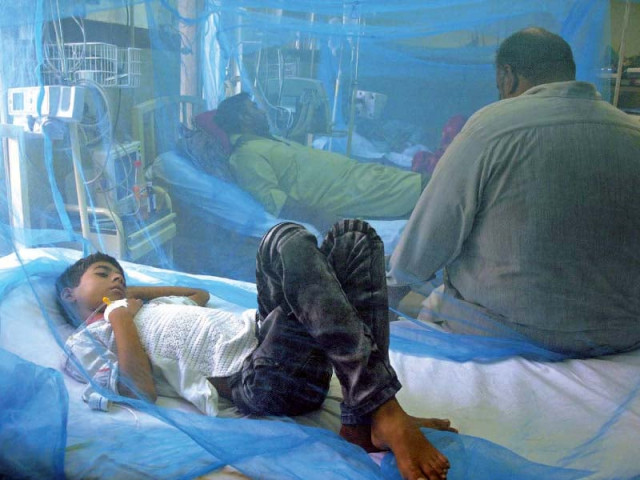Cold helps tame dengue in Islamabad
Health experts say virus in mosquito’s body does not reach its salivary glands during lower temperatures

PHOTO FILE
Federal Government Polyclinic (FGPC) Hospital Spokesperson Dr Sharif Astori on Monday confirmed that there has been a sharp decline in the influx of dengue affected patients in recent weeks as opposed to dozens of patients streaming in daily just a month ago.
He noted that dengue cases are expected to completely dry up as the mercury further drops.
The danger from the vector-borne mosquitoes, Dr Astori warned, cannot be ruled out completely yet. He added that the danger still prevails in the designated high-risk areas.
Explaining why the virus, which has so far affected thousands of people in the twin cities of Islamabad and Rawalpindi, has suddenly faded, Dr Astori said that higher temperatures act as a catalyst for the growth and spread of the mosquitoes.
Lower and fluctuating temperatures, however, impede the entire process.
The medical expert said that when the temperatures drop to 18 degrees Celsius or below, the virus in the body does not easily reach the salivary glands of the mosquitoes, which, in turn, reduces its chances of being transmitted to the human victims of the mosquito.
Although the growth of Aedes aegypti mosquito will not completely stop in the cold weather, Dr Astori said that they do fall to a minimum.
Asked about why a large number of cases were being reported even after the onset of winter last month, Dr Astori conceded that the rate of decline in dengue cases was slower than expected, adding that they have still reserved 10 beds for dengue patients in the hospital.
On the number of dengue patients who have been brought to the hospital during the transmission season, Dr Astori said that as many as 17,506 suspected dengue patients had visited the hospital this year seeking treatment. Of these, he said that some 6,006 were confirmed to have dengue and were provided treatment accordingly.
Of these, he said that as many as nine dengue-infected patients had died of the disease.
Similarly, the Pakistan Institute of Medical Sciences (Pims) Spokesperson Dr Wasim Khawaja emphasised that they are currently in the process of developing anti-dengue and dengue treatment strategies for next year. This will include tracking and destroying possible mosquito breeding sites to control the spread f the disease.
He added that the dengue mosquitoes primarily breed in pools of water be they in small containers such as earthenware jars, metal drums and concrete cisterns which are generally used to store water for domestic usage. Moreover, mosquitos also germinate in pools of water collected in discarded plastic food containers, used automobile tires and other items which can collect water.
Dr Khawaja urged citizens to properly dispose of solid waste and stop uncovered water storage practices in their houses to prevent access to egg-laying female mosquitoes. He added that preventive measures could help restrict the spread of the disease.
Talking about the transmission of the disease to humans, the medical practitioner said that the virus was transmitted to humans through the bites of infective female Aedes mosquitoes,
Subsequently, he informed, the virus then circulates in the blood of infected humans for two to seven days, at approximately the same time as they suffer from fever with the clinical features of dengue fever varying from person to person according to the age.
He added that the normal mosquitoes also become infected if they bite a person already infected with the virus. Dr Khawaja said after virus incubation for eight to ten days, an infected mosquito became able, during probing and blood feeding, of transmitting the virus to susceptible individuals for the rest of its life.
Dr Khawaja said dengue hemorrhagic fever was a potentially life-threatening complication characterized by high fever and hemorrhagic phenomena, lamenting that the mosquito-borne infection has become a major public health concern in recent years.
Published in The Express Tribune, December 10th, 2019.



















COMMENTS
Comments are moderated and generally will be posted if they are on-topic and not abusive.
For more information, please see our Comments FAQ